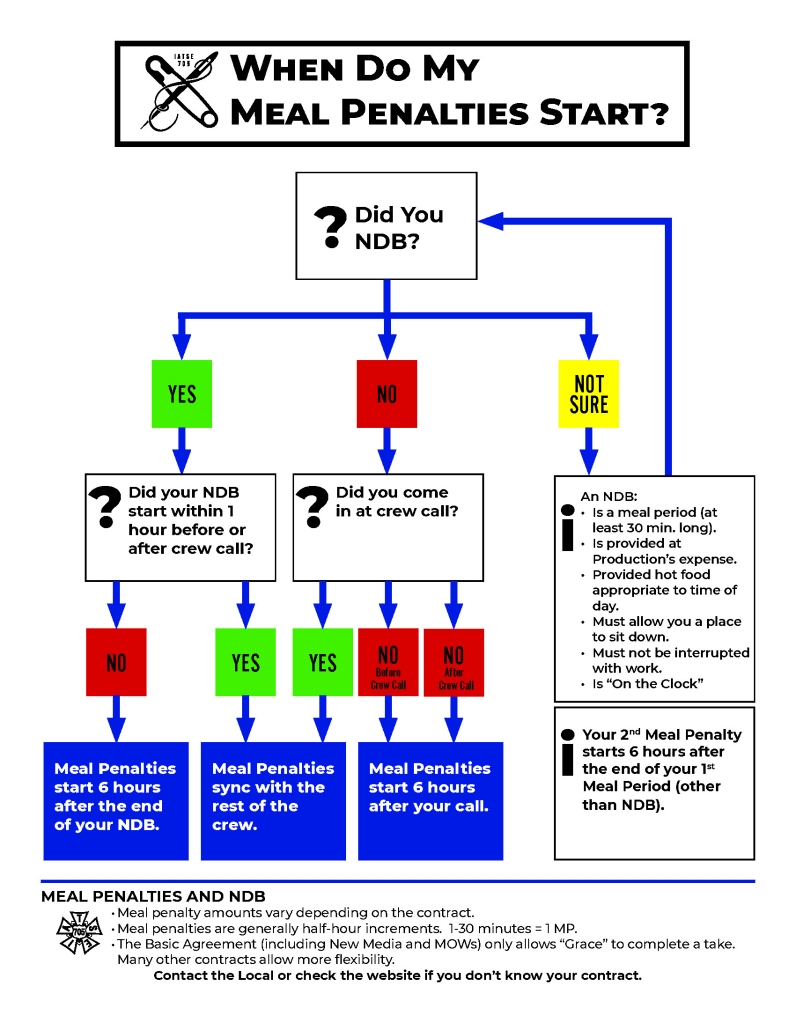Frequently Asked Questions
Do you have a Frequently Asked Question that you would like to see on this page?
Please click the link below to submit your FAQ
What is the daily turnaround (call-back) time for Local 80?
- 10 hours
- 9 hours (Distant Hire)
- 8 hours for those assigned through studio technical/production services (ie: Gang Work)
What is the weekend turnaround (call-back) time for Local 80?
- An employee who works five (5) consecutive days in the workweek shall be entitled to a weekend rest period of fifty-four (54) hours. (There are a few exceptions that will bring this number down to 50 hours listed below)
- 5th day worked is no longer than 12 hours
- Exterior night shots scripted for the 5th day, location restrictions, weather or natural hazard delay
- An employee who works six (6) consecutive days in the workweek shall be entitled to a rest period of thirty-two (32) hours
- Low Budget Theatrical Agreement has a fifty-two (52) hour weekend turnaround
What is the rate for each meal penalty, and what length of time represents 1 meal penalty?
- Each Meal Penalty represents 30 minutes or a fraction thereof
- When working at a studio, the following meal penalty structure applies:
- 1st meal penalty = $8.50
- 2nd meal penalty = $11.50
- 3rd and 4th meal penalty = $13.50
- 5th AND each succeeding meal penalty up to 19th = $25.00
- 20 or more meal penalties in a week = One (1) hour of pay at the prevailing rate for each one-half (1/2) hour of meal delay
- When working outside of a studio, the following meal penalty structure applies
- 1st meal penalty = $7.50
- 2nd meal penalty = $10.00
- 3rd and 4th meal penalty = $12.50
- 5th AND each succeeding meal penalty up to 19th = $25.00
- 20 or more meal penalties in a week = One (1) hour of pay at the prevailing rate for each one-half (1/2) hour of meal delay
What does “calling grace” mean? And how often can productions use this?
Grace is a 12-minute period that may be called for “production efficiency”. This grace period can be utilized for just about any reason. Grace must be announced by the production, and may not be scheduled or automatic, or utilized every day.
What is a “Meal Extension” and how often can it be utilized?
An extension is a 30-minute period that may only be called to complete takes in progress or to wrap (camera can not be moved during this time). An extension may not be scheduled or automatic. Grace and extension may not be utilized together on the same meal break. If either the 12-minute Grace or 30-minute Extension time periods are exceeded, then meal penalties are paid from the time they would originally have been due.
What is NDB and why do most productions require it before starting my workday?
“NDB” stands for “Non-Deductible Break”. The provision says that if, after you have started work, the production supplies a hot meal and gives you 30 uninterrupted minutes in which to eat it, they can then start your lunch six hours after the end of the NDB without a meal penalty. If you are given a pre-call but not a full 30-minute break in which to eat your breakfast, you are owed meal penalties.
The point that triggers a NDB is not just that food is provided, but that you are given 30 full – uninterrupted minutes on the clock in which to eat it. A breakfast burrito hastily eaten while walking to set does not count for “NDB”.
How long does a lunch period last, and when does the time begin?
According to California Law, meal periods need to be at least 30 minutes of uninterrupted off-the-clock rest. Past practice in our industry has established two methods to achieve this lunch period.
-
- 30 minute “Last Man” – This 30 minute meal period does not begin until the “Last Crew Member” has gone through the line and received their food.
- 1 hour “Walk Away” – A 1 hour period that begins as soon as employees are no longer under the control of the employer
Time periods in which employees are still under the control of the employer is paid time. Examples of “employer control” include: making the set safe, van rides to catering, distant walks to catering, Producers taking priority and giving priority to other employees in catering lines. To summarize, your lunch break does not begin until you are completely out of control of your employer.


